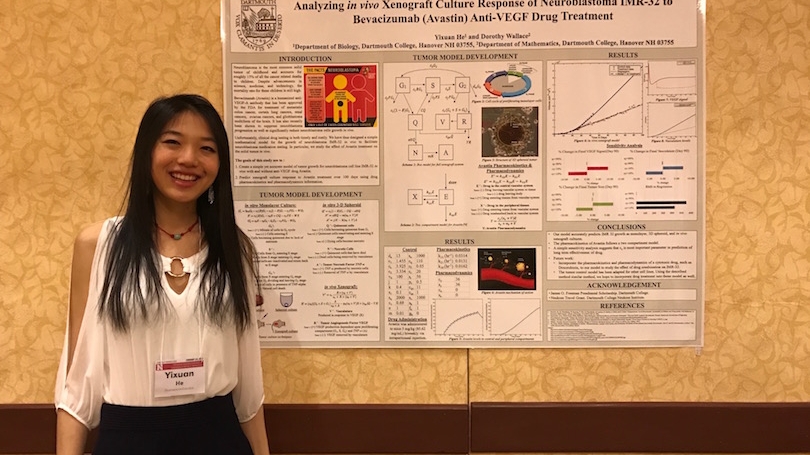
Menu
- Public Policy
- Leadership
- Funding
- News & Events
- About the Center
Back to Top Nav
Back to Top Nav
Back to Top Nav
Back to Top Nav
Thanks to the support from the Nelson A. Rockefeller Center for Public Policy and the Social Sciences at Dartmouth College, I was able to attend the Nebraska Conference for Undergraduate Women in Mathematics from February 3-5 at the University of Nebraska-Lincoln. At the conference, I presented the results of my research project in applied mathematics, connected with experts in the field, and made friends with fellow female mathematicians. The experienced was both rewarding and eye opening.
The goal of my mathematical biology project is to use a system of ordinary differential equations to create a simple but accurate mathematical model that describes and predicts the growth of neuroblastoma in the body with and without drug treatments. Neuroblastoma is the leading cause of cancer death in children, and only half of those diagnosed survive. Thus, there is a strong need for an effective neuroblastoma treatment plan. While experiments conducted in traditional pharmaceutical laboratories can be slow and expensive, mathematical models provide a fast but accurate way to test the effect of various drug treatments via cancer growth modeling and simulation. Though many mathematical models exist, they often are too complex with too many parameter or are too simple that they do not accurately represent tumor growth in the body. In addition, no models tuned to neuroblastoma growth exist in the literature. Our model contains few parameters but is able to accurately predict neuroblastoma growth in vivo, thus providing a means for researchers to test the effect of various drug treatments in order to determine the optimal treatment protocol for neuroblastoma.
As a female mathematics student, I have always been keenly aware of the gender imbalance in this field. In middle school, I was the only girl on our Mathcounts team, and in my various mathematics courses, males greatly outnumber females. I believe that this learning environment is detrimental to the academic development of many female mathematics students.
The Conference for Undergraduate Women in Mathematics at UNL was the first time in my mathematics academic career that I have been in a female dominated space. Being surrounded by passionate female mathematicians gave me a sense of confidence and empowerment that I had never experienced before. The conference provided me with role models and insider knowledge in the field of mathematics. Furthermore, I was able to present and discuss the results of my research with peers, which not only helped develop my presentation skills but also refined my research. I also had the chance to learn about life in graduate school from the perspective of current female graduate students through various panels, workshops, and discussions.
I am extremely grateful to the Rockefeller Center for providing me with funding to attend this unforgettable conference. I strongly encourage all students, regardless of the area of study, to attend off campus conferences and workshops. You will be able to explore other opportunities in your field and make connections with incredible individuals.
- Submitted by Yixuan He '18, Rockefeller Mini-Grant Recipient
The Rockefeller Center's Mini-Grants program funds registration fees for students attending conferences, as well as the costs of bringing guest speakers to Dartmouth. The views and opinions expressed here are the author’s own and do not necessarily represent the views and opinions of the Rockefeller Center or constitute an endorsement by the Center.